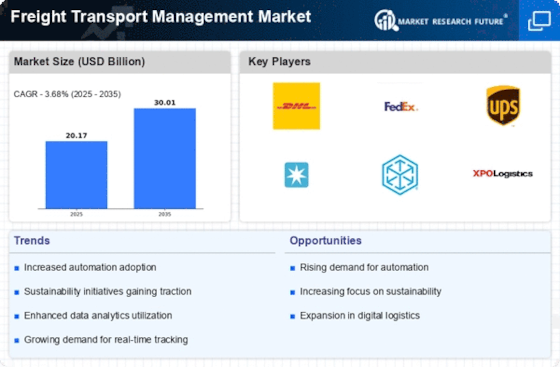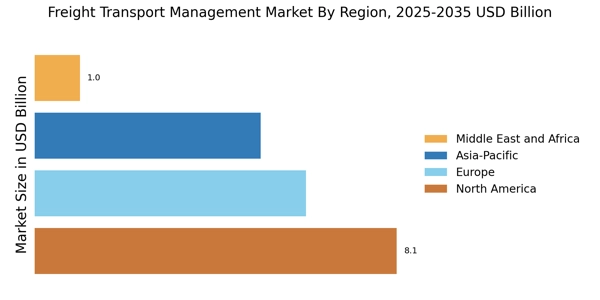E-commerce Growth
The rapid expansion of e-commerce is a pivotal driver for the Freight Transport Management Market. As online shopping continues to gain traction, the demand for efficient freight transport solutions is escalating. In 2025, e-commerce sales are expected to surpass 6 trillion dollars, necessitating robust logistics frameworks to handle increased shipment volumes. This growth compels logistics providers to enhance their capabilities, ensuring timely deliveries and customer satisfaction. Consequently, companies are investing in advanced freight management systems to streamline operations and accommodate the evolving needs of e-commerce. The Freight Transport Management Market is thus positioned to benefit significantly from this trend, as businesses seek to optimize their supply chains to meet consumer expectations.
Rising Fuel Costs
Rising fuel costs represent a significant challenge and driver within the Freight Transport Management Market. Fluctuations in fuel prices can dramatically impact operational expenses for logistics providers. As fuel costs continue to rise, companies are compelled to seek more efficient transport solutions to mitigate these expenses. This situation has led to an increased focus on optimizing routes, consolidating shipments, and investing in fuel-efficient vehicles. Moreover, the Freight Transport Management Market is witnessing a shift towards alternative fuels and electric vehicles as companies strive to reduce their carbon footprint and operational costs. The interplay between fuel prices and logistics strategies is likely to shape the future of the industry.
Regulatory Compliance
Regulatory compliance is becoming increasingly critical within the Freight Transport Management Market. Governments worldwide are implementing stringent regulations aimed at enhancing safety, reducing emissions, and ensuring fair competition. For instance, regulations concerning emissions standards are pushing logistics companies to adopt greener practices. Compliance with these regulations often requires investment in new technologies and processes, which can be costly but necessary for long-term sustainability. The Freight Transport Management Market must adapt to these changes, as non-compliance can result in hefty fines and reputational damage. Therefore, companies that proactively align their operations with regulatory requirements are likely to thrive in this evolving landscape.
Technological Advancements
The Freight Transport Management Market is experiencing a surge in technological advancements that enhance operational efficiency. Innovations such as artificial intelligence, machine learning, and the Internet of Things are being integrated into logistics systems. These technologies facilitate real-time tracking, predictive analytics, and automated decision-making processes. According to recent data, the adoption of AI in logistics is projected to grow at a compound annual growth rate of over 30% in the coming years. This trend indicates a shift towards more data-driven strategies, allowing companies to optimize routes, reduce costs, and improve service delivery. As a result, organizations that leverage these technologies are likely to gain a competitive edge in the Freight Transport Management Market.
Consumer Demand for Transparency
Consumer demand for transparency is increasingly influencing the Freight Transport Management Market. Customers are now expecting real-time visibility into their shipments, including tracking information and delivery updates. This demand for transparency is driving logistics providers to adopt advanced tracking technologies and communication platforms. Companies that can offer enhanced visibility are likely to gain customer loyalty and competitive advantage. In response, the Freight Transport Management Market is evolving to incorporate more user-friendly interfaces and data-sharing capabilities. This trend not only improves customer satisfaction but also fosters trust between logistics providers and their clients, ultimately shaping the future dynamics of the industry.


















Leave a Comment